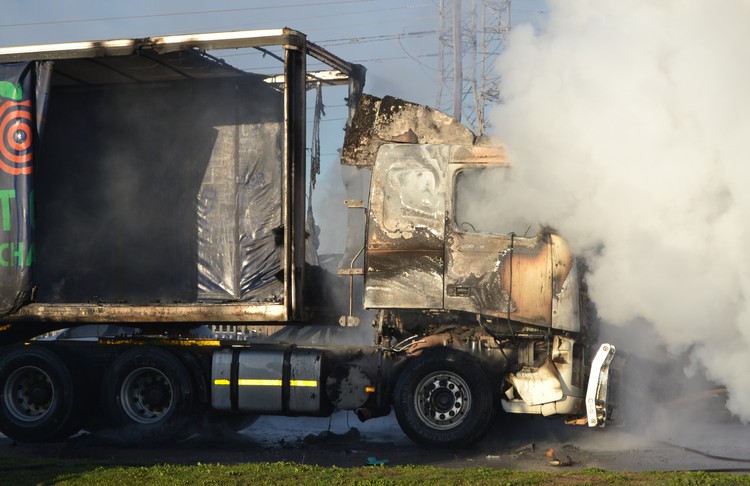Five trucks torched in Gqeberha protests over the past month
Protesters demanding electricity and water stone and burn trucks, but municipality say the torchings are purely criminal
A Volvo truck carrying produce burnt last Friday. It was one of five trucks torched by protesters along the R335 over the past month. Photo: Thamsanqa Mbovane
-
Residents from informal settlements flanking a road freight route to Ngqura have stoned and burnt trucks to protest a lack of electricity and water.
-
The municipality denies the torching of trucks is related to protests over service delivery, claiming they are simply “criminal acts”.
-
One suspect has been arrested and charged with public violence and malicious damage to property.
Trucks continue to be stoned and set alight on the M17 Addo Road in Motherwell, Gqeberha, bringing the total to five over the last month as protesters from surrounding informal settlements demand the Nelson Mandela Bay municipality supply them with water and electricity.
The R335, along which many goods are trucked to the port of Ngqura, is flanked by the Nomkanjani, Powerline, and Ramaphosa informal settlements.
A coal truck was torched on 23 June by protesters demanding the electrification of about 3,000 shacks. Protests flared again on Wednesday 12 July resulting in a fruit truck being stoned and set alight, and the driver of a manganese truck crashing into the wall of a residence after losing control while trying to dodge rocks and protesters, according to Police spokesperson Colonel Priscilla Naidu.
Naidu confirmed a white Volvo truck carrying fruit was also halted and torched on Friday 14 July.
Regarding the torching of the white Volvo truck last Friday, Naidu said: “The driver stopped his truck, and the protesters then pulled the driver and his assistants out of the truck. The truck was then torched. Passengers were unharmed. The incident was due to service delivery.”
GroundUp arrived at the scene while the truck was burning, with smoke billowing as about 12 armed police officers monitored the situation. A fire truck arrived to extinguish the flames.
A witness, who asked not to be named as he lives in the area, said the burning of trucks was “hooliganism” not protest. He said there were three people in the white Volvo truck, being the driver and a male and female passenger.
“The protesters pulled the three out of the truck. They pleaded for forgiveness. One of the protesters klapped the mlunkazi (white woman passenger) before releasing the three to run,” he said.
Another truck was torched on the same road on Wednesday this week after a power outage had dragged on for five days.
Naidu said the truck was set alight at about 6pm. “Police were quick to react and prevented the complete torching of the truck. Protesters ran away.”
She said one suspect has been arrested and charged with public violence, damage to essential infrastructure, and malicious damage to property.
Nelson Mandela Bay Municipality issued a statement on Wednesday stating the power outage affecting Aloes, Coega, Dumbrody, Hougham Park, Kamvelihle, and surrounding areas was due to the Coega overhead line breaker having tripped.
“Operators have been dispatched for fault-finding and tests before restoration of power supply. We sincerely apologise for any inconvenience,” stated the municipality.
When mayor Gary van Niekerk visited flooded shacks in Nomakanjani informal settlement on 12 June, protesters from neighbouring Ramaphosa and Powerline informal settlements blocked his convoy, demanding electrification.
In Nomakanjani, residents told van Niekerk they were subject to flooding, many shacks lacked electricity supply, and the area suffered loadshedding beyond the scheduled hours. The mayor was also informed that many standpipes from which residents obtained water, were dry.
Accompanied by officials from the municipality’s electricity and water departments, van Niekerk promised services would be delivered.
A municipal worker from the electricity and energy directorate who cannot be named as he had no authority to speak to the press said: “It’s easy for politicians to say this will be done but it’s difficult for us to access the area. We always think of our safety which is not guaranteed. Anything could happen when there is a protest.”
PR councillor Ncebakazi Wala told GroundUp that it was important for mayoral committee members in the coalition government to work together.
“Coalition (government) is full of sabotage. When the councillors don’t work together, the masses suffer,” said Wala.
She said only when the municipality’s executive cooperated peace would be restored to the area.
Nelson Mandela Bay Municipality spokesperson Kupido Baron said the torching of trucks was a criminal act and denied it was due to service delivery protests.
Kupido did not answer questions on service delivery time-frames.
Support independent journalism
Donate using Payfast

Don't miss out on the latest news
We respect your privacy, and promise we won't spam you.
Next: Protesters force city councillors to walk through sewage
Previous: Over 1,000 shack dwellers protest: “We are tired of living in squalor”
© 2023 GroundUp. This article is licensed under a Creative Commons Attribution-NoDerivatives 4.0 International License.
You may republish this article, so long as you credit the authors and GroundUp, and do not change the text. Please include a link back to the original article.
We put an invisible pixel in the article so that we can count traffic to republishers. All analytics tools are solely on our servers. We do not give our logs to any third party. Logs are deleted after two weeks. We do not use any IP address identifying information except to count regional traffic. We are solely interested in counting hits, not tracking users. If you republish, please do not delete the invisible pixel.

